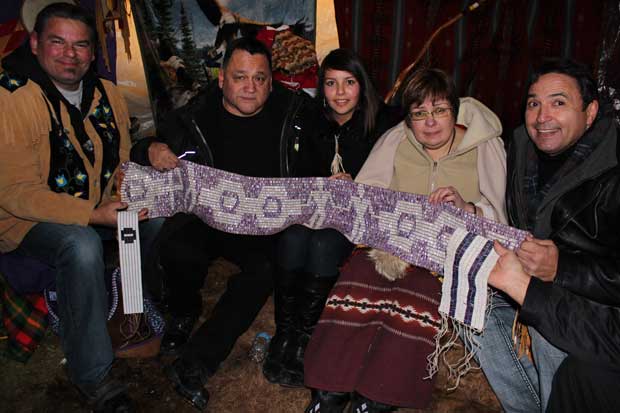

THUNDER BAY – Editorial – Attawapiskat could be the impetus for change. The tiny community in Ontario’s North has become a focal point for Canada’s Aboriginal community and its continued struggles with the Conservative government.
Chief Theresa Spence states, ““How could the Crown and the Governor General close their eyes to the blatant violations of Treaty?” The concern from First Nations, and from the grassroots Idle No More movement is that the federal government enter into ‘Nation to nation’ talks to respect the treaties.
“We are giving them the opportunity to correct those actions and move forward in the true spirit and intent of Treaty, and they [the Canadian Government] cannot even meet us halfway,” continues Chief Spence. “In fact, they respond to us as though we are committing a criminal act for demanding the fulfillment and implementation of our rights — this is discrimination”.
Attawapiskat is an impetus for change
 It is likely that the situation in Attawapiskat, a community that virtually no one in Canada had heard about, and fewer still could pronounce only a few years ago is serving as the impetus for change. The conditions in this northern community have generated controversy.
It is likely that the situation in Attawapiskat, a community that virtually no one in Canada had heard about, and fewer still could pronounce only a few years ago is serving as the impetus for change. The conditions in this northern community have generated controversy.
[sws_pullquote_right]im·pe·tus [im-pi-tuhs] noun, plural im·pe·tus·es. 1. a moving force; impulse; stimulus: The grant for building the opera house gave impetus to the city’s cultural life. 2. (broadly) the momentum of a moving body, especially with reference to the cause of motion. Origin: 1650–60; < Latin: an attack, literally, a rushing into, perhaps by haplology from *impetitus (though the expected form would be *impetītus; see appetite), equivalent to impetī-, variant stem of impetere to attack ( im- im-1 + petere to make for, assault) + -tus suffix of v. action [/sws_pullquote_right]
Some in the government, and some in the media, have tried to make Chief Theresa Spence a target. Others are seeing in the Chief’s efforts the symbol of standing up to a government that doesn’t care.
The image of ‘big government’ attacking a solitary woman has united many First Nations, and put in place the potential for grassroots change.
One might almost think of the image from a political generation before when Prime Minister Brian Mulroney’s constitutional package fell when one MP stood in the House of Commons. Elijah Harper stood with his single Eagle feather and voted no on Mulroney’s constitutional dream.
Prime Minister Stephen Harper isn’t in the same constitutional quandary that Prime Minister Mulroney was in. Harper could be facing a giant no vote on economic efforts. The impact would be the same.
For the federal government in attacking Chief Spence, it likely plays well to the Conservative base. In the last quarter of 2012, the Conservative Party of Canada raised $5,088,616.70 from 39,140 donors. In the last quarter of 2011, the Conservatives raised $4,100,154.71 from 35,747 donors. By contrast, the New Democrats raised $1,613,434.61 from 17,975 donors in quarter four of 2011. In the last quarter of 2012, the New Democrats raised $2,478,937.78 from 24,309 donors.
Prime Minister Harper came to office with a huge opportunity.
Long term or short term view
The short-run benefits however are not likely going to make many of the major mining companies and the support industries all that happy.
In the long run – blockades of the ice road in Attawapiskat are potentially only the beginning. The apparent silence of the federal government in solving that situation will have the impact on mining in Canada.
The Conservatives don’t seem to be thinking long-term. What is not seemingly understood in Ottawa is that what is wanted is not a domination over the lands, but a partnership, along with a care and concern for those lands.
While some First Nations are likely to seek a working relationship with the federal government. Growing numbers of the grassroots First Nations peoples are seeing through what they see as the Ottawa smokescreen.
They are using social media, and a savvy strategy of education against the Conservative machine.
For many Members of Parliament the potential of a motivated Aboriginal community getting engaged in the political process is likely well below their comprehension.
A motivated to vote Aboriginal population
The Parliamentary Secretary for the Minister of Aboriginal Affairs is Kenora MP Greg Rickford.
Rickford won his seat in the 2011 election with 47% of the vote in the Kenora riding. Across the many First Nations communities in Rickford’s riding, the voter turnout was very low. The Conservative MP is in Ottawa with a margin of victory of 4,712 votes. If the voter turnout in the northern communities in the Kenora riding were the same as the rest of Canada MPs like Mr. Rickford would be private citizen.
Since the issue of Attawapiskat flared up, many people who had never voted, or considered politics as a serious concern are now getting political.
It is a move that has been long in coming, and now that it is, along with all the national and international efforts, it is likely to change Canada.
When people who have never voted, never considered voting are motivated to get political, it should have warning bells ringing
Attawapiskat Chief Spence taking another step
The 82nd Session of the United Nations Committee on the Elimination of Racial Discrimination (CERD) began this week in Geneva Switzerland. Chief Spence asked the International Indian Treaty Council (IITC) to assist the Mushkegowuk People of Attawapiskat First Nation to make an urgent submission to the international human rights body.
The reasons are explained in a release issued by the Mushkegowuk Council:
“The Urgent Action filing focuses on the urgent violations of Treaties and Aboriginal rights by the Canadian Government through the adoption of two omnibus budget bills, Bill C-38 and C-45. These bills were passed in June and December 2012 without the Free Prior and Informed Consent or any consultation with Indigenous Nations in Canada.
“The filing also addresses two other unresolved urgent issues raised during the periodic review of Canada at the 80th Session of the CERD in February of 2012 — the ongoing lack of safe drinking water for First Nations and the critical housing crisis faced by Attawapiskat First Nation. The CERD, in its Concluding Observations addressing Canada issued on March 9th, 2012 [CERD/C/CAN/CO/19-20] requested that the Canadian government provide them with a report within one year as to their “progress and results” in addressing these urgent situations. To date they have failed to do so”.
Indigenous Peoples, the Canadian government, and the world will be paying close attention to the CERD’s consideration of a submission from the International Indian Treaty Council (IITC) and the Mushkegowuk People of Attawapiskat First Nation in Canada filed last week under the CERD’s Early Warning and Urgent Action Procedures.
What does it all mean?
The 18-member CERD is the Treaty Monitoring Body for the International Convention on the Elimination of All Forms of Racial Discrimination (ICERD), one of 9 legally-binding International Human Rights Treaties within the United Nations system. The CERD is responsible for periodically reviewing the compliance of the 175 countries (“State parties”) which have ratified it, which includes Canada.
The Urgent Action and Early Warning Procedures allow the CERD to analyze and assess critical situations that may require urgent action outside the regular country reviews. The guidelines for the application of these Procedures include: (a) Presence of a significant and persistent pattern of racial discrimination, as evidenced in social and economic indicators; (c) Adoption of new discriminatory legislation; (h) Encroachment on the traditional lands of indigenous peoples or forced removal of these peoples from their lands, in particular for the purpose of exploitation of natural resources; and (i) Polluting or hazardous activities that reflect a pattern of racial discrimination with substantial harm to specific groups.
The submission filed jointly by IITC and the Mushkegowuk People of Attawapiskat First Nation addresses all of these areas of concerns.
Ron Lameman of Beaver Lake Cree Nation, represents Treaty No. 6 on IITC’s Board of Directors. He expressed the importance of this submission and the issues it addresses for the all Indigenous Peoples in Canada:
“The submission to the Urgent Action procedure of the CERD initiated by Chief Spence and the Mushkegowuk People of Attawapiskat First Nation through the IITC is indeed crucial and timely due to genocidal legislative agenda of the Stephan Harper conservative government.
“The non stop right wing and racist policies of this government have awakened a ‘Sleeping Giant’ as demonstrated by the Idle no More movement, which was inspired in part by the courageous actions of Chief Spence and the other spiritual fasters.
“The world needs to know of the total disregard shown by this government towards the Indigenous Peoples of this part of great Turtle Island. When you disregard the sacred Treaties and continue to disrespect our Mother Earth and all of creation including the sacred water which sustains all life on the planet, there is no way that the indigenous Peoples can stand back and do nothing.
“What has happened until now is only the beginning. As stated by the elders and leaders of today ‘unless the governments and industry slow down, step back and listen to the young people and the Peoples of the land, things could get a lot worse before they get better’.”
Change is the one constant in the world.







